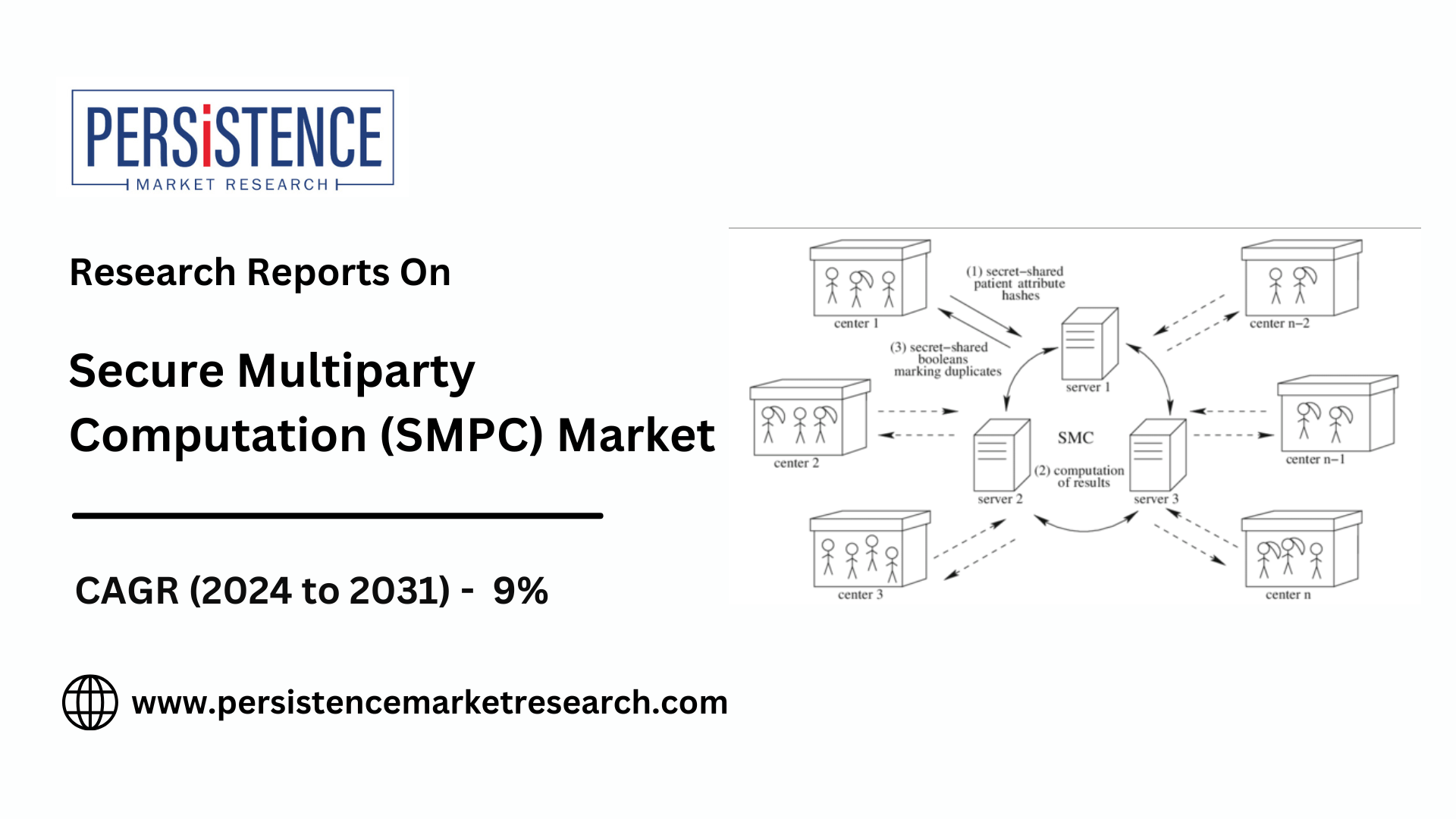Secure Multiparty Computation (SMPC) Demand Surges in Developing Countries

Strong 8k brings an ultra-HD IPTV experience to your living room and your pocket.
The global Secure Multiparty Computation (SMPC) market is expected to grow from US$ 0.9 billion in 2024 to US$ 1.7 billion by 2031, with a CAGR of 9%. This growth is driven by increasing investments in privacy-preserving technologies and the rising demand for secure, collaborative data processing across sectors like healthcare, finance, and supply chain management. SMPC is gaining traction due to stringent regulations like GDPR and CCPA, which promote secure data handling. North America and Europe are key markets, with North America holding a 40% share in 2024. Cloud-based SMPC solutions are becoming increasingly popular due to their cost-effectiveness and scalability. Additionally, the integration of post-quantum cryptography and the adoption of specialized hardware are boosting performance and security in SMPC deployments.
Introduction to Secure Multiparty Computation (SMPC)
Secure Multiparty Computation (SMPC) is a cryptographic technology designed to enable collaborative data analysis without compromising individual privacy. This cutting-edge solution ensures that sensitive information from multiple parties can be processed and analyzed collectively, without revealing the underlying data to any single participant. With the growing demand for data privacy and secure digital ecosystems, SMPC has emerged as a crucial enabler for privacy-preserving applications, especially in developing countries.
Why Developing Economies Are Embracing SMPC
Developing economies are experiencing a rapid digital transformation driven by the proliferation of smartphones, internet connectivity, and digitized public services. However, these nations also face challenges related to data security, limited regulatory frameworks, and a growing threat of cyberattacks.
SMPC offers a robust solution to these challenges by ensuring secure data sharing and collaboration across various industries, including finance, healthcare, and government services. This technology aligns perfectly with the priorities of developing nations, which seek to leverage data for economic growth while maintaining privacy and security.
Driving Forces Behind SMPC Adoption in Developing Nations
1. Growing Emphasis on Data Privacy Regulations
As global conversations around data privacy gain momentum, developing countries are introducing stricter data protection laws. SMPC serves as an effective mechanism to comply with these regulations while enabling data-driven innovation. Governments and enterprises are leveraging SMPC to securely collaborate on sensitive data without breaching compliance requirements.
2. Rising Demand for Financial Inclusion
Financial institutions in developing nations are increasingly adopting SMPC to address the challenges of secure data sharing for credit assessments, fraud detection, and anti-money laundering efforts. By enabling privacy-preserving data analysis, SMPC helps banks and fintech firms expand financial inclusion while safeguarding customer information.
3. Transformation of Healthcare Systems
Healthcare systems in emerging economies are leveraging SMPC for secure data exchange and collaboration among hospitals, research institutions, and public health agencies. This enables privacy-protected medical research, disease surveillance, and personalized healthcare solutions while adhering to patient confidentiality norms.
4. Enhancing Digital Governance
Governments in developing countries are embracing SMPC to enable secure and transparent digital governance. Whether it's implementing tax systems, welfare programs, or national security initiatives, SMPC allows for collaboration among multiple stakeholders while maintaining data integrity and confidentiality.
Key Use Cases of SMPC in Developing Economies
1. Secure Cross-Border Data Collaboration
Developing countries often collaborate on regional initiatives such as trade, healthcare, and disaster management. SMPC facilitates secure and seamless data sharing across borders, ensuring that sensitive information remains protected while fostering collaboration.
2. Privacy-Preserving Machine Learning
AI and machine learning applications are gaining traction in emerging markets, but privacy concerns often hinder their adoption. SMPC addresses this challenge by enabling organizations to train machine learning models on encrypted datasets, ensuring data privacy throughout the process.
3. Fraud Prevention in E-Commerce
The e-commerce sector in developing nations is booming, but it is also prone to fraud and cyberattacks. SMPC empowers e-commerce platforms to collaborate with financial institutions and law enforcement agencies to detect and prevent fraud without exposing user data.
4. Advancing Public Health Initiatives
SMPC is revolutionizing public health in developing economies by enabling secure analysis of health data for disease prevention, vaccine development, and outbreak response. It ensures that sensitive patient information is never compromised during collaborative research efforts.
Challenges to SMPC Implementation in Developing Countries
1. High Initial Costs
The deployment of SMPC solutions often involves significant upfront investment in technology infrastructure and expertise. For developing countries with limited resources, this can be a barrier to widespread adoption.
2. Limited Awareness and Expertise
The understanding of SMPC and its potential benefits is still nascent in many developing economies. Lack of awareness and expertise among policymakers, businesses, and IT professionals can slow down adoption rates.
3. Integration with Legacy Systems
Many developing countries rely on outdated digital infrastructure, which can be incompatible with advanced cryptographic technologies like SMPC. This necessitates additional investment in system upgrades and integration.
4. Regulatory Ambiguities
While data privacy regulations are evolving, many developing nations lack clear guidelines on the implementation of advanced technologies like SMPC. This creates uncertainty for organizations looking to adopt the technology.
Overcoming Barriers to Adoption
1. Promoting Public-Private Partnerships
Governments and private enterprises can collaborate to fund and implement SMPC solutions, sharing costs and expertise to drive adoption. Such partnerships can accelerate the deployment of SMPC in key sectors like healthcare and finance.
2. Building Awareness and Capacity
Awareness campaigns, workshops, and training programs can help build understanding and expertise in SMPC among stakeholders. Educational institutions can also play a role by introducing SMPC concepts into their curriculums.
3. Leveraging Open-Source Solutions
To reduce costs, developing countries can explore open-source SMPC solutions. These platforms provide access to robust cryptographic tools without the high expenses associated with proprietary systems.
4. Establishing Clear Regulatory Frameworks
Governments must create comprehensive guidelines for the use of SMPC, providing clarity to organizations and encouraging investment in the technology.
Future Outlook for SMPC in Developing Countries
The adoption of SMPC in developing economies is expected to grow significantly over the next decade. With advancements in technology, falling implementation costs, and increasing global collaboration, SMPC is poised to become a cornerstone of secure data collaboration in these regions.
Conclusion: A Pathway to Secure Digital Transformation
Secure Multiparty Computation (SMPC) is more than a technology; it is a gateway to secure and collaborative digital transformation for developing nations. By addressing data privacy concerns, enabling cross-sector collaboration, and driving innovation, SMPC holds immense potential to unlock new economic and social opportunities.
As governments, businesses, and communities in emerging economies embrace this transformative solution, the world will witness a more secure and interconnected digital landscape, where privacy and progress go hand in hand.
Note: IndiBlogHub features both user-submitted and editorial content. We do not verify third-party contributions. Read our Disclaimer and Privacy Policyfor details.







